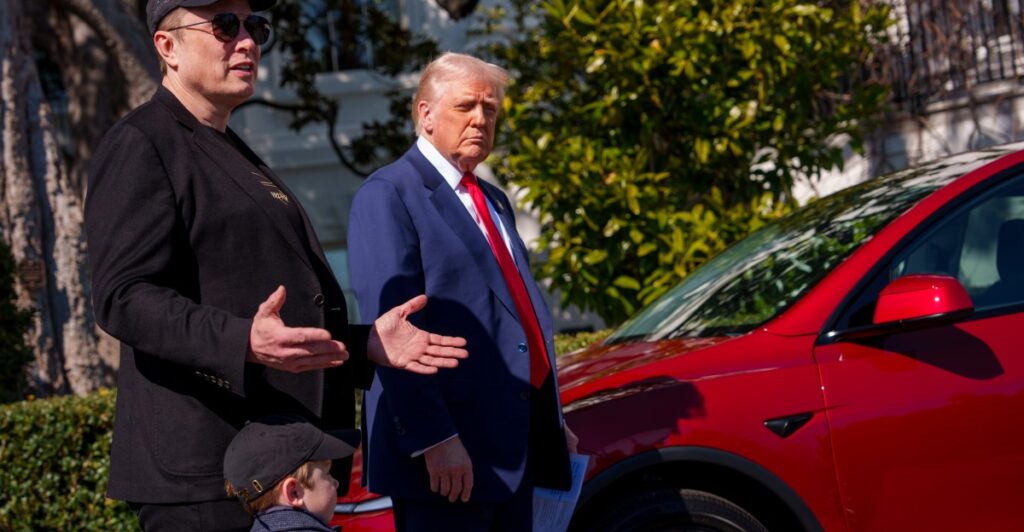Elon Musk and Donald Trump are once again at odds over the president’s domestic policy bill, with tensions escalating as Trump hinted at the possibility of deporting the billionaire entrepreneur. Speaking to reporters on Tuesday morning, Trump stated, “we’ll have to take a look” into Musk’s status, suggesting the Department of Government Efficiency (DOGE) might be involved in scrutinizing Musk’s business operations.
The clash between the two high-profile figures centers on Trump’s “Big Beautiful” domestic policy bill, which Musk opposes, citing concerns over the budget deficit. However, the potential removal of electric vehicle (EV) tax credits, which benefit Musk’s company Tesla, is also believed to be a significant factor in his opposition. The renewed dispute comes after a brief lull in their public exchanges, which had previously included Musk deleting tweets that controversially linked Trump to Jeffrey Epstein.
The Return of a Public Feud
This latest development follows a period of relative quiet after a series of heated exchanges earlier this year. On Monday evening, as the Senate engaged in a “vote-a-rama” to advance the spending bill, Musk took to social media to voice his disapproval once more. He threatened to support primary challenges against politicians backing the bill and hinted at forming a new political entity, the America Party, should the bill pass.
In response, Trump posted on his social media platform, Truth Social, suggesting that DOGE could potentially cut subsidies for Musk’s companies. Trump claimed, “Elon would probably have to close up shop and head back home to South Africa” without these financial supports.
Background of the Dispute
Musk has long been a critic of government spending policies that he perceives as fiscally irresponsible. His opposition to Trump’s bill is consistent with his past stance, although the specific impact on Tesla’s financial incentives adds a layer of complexity to his objections. Historically, Musk has benefited significantly from government subsidies, which have played a crucial role in the growth of his ventures, including SpaceX and Tesla.
Trump, on the other hand, has consistently criticized mandates and subsidies related to electric vehicles, arguing that they distort the market. In his Truth Social post, Trump reiterated his opposition to the EV mandate, stating, “Electric cars are fine, but not everyone should be forced to own one.”
Expert Opinions and Analysis
Experts in political strategy and economics suggest that the public spat between Musk and Trump reflects broader tensions between business leaders and government policy. Dr. Lisa Reynolds, a political analyst, commented, “This is a classic example of the friction between private enterprise and public policy. Musk’s threat to form a new party underscores the potential for business leaders to exert significant influence on political discourse.”
Economists also weigh in on the potential impact of cutting subsidies. According to Dr. Michael Chen, an economist specializing in public policy, “Subsidies have been instrumental in advancing technological innovation in the U.S. Eliminating them abruptly could have unintended consequences for the economy and the nation’s technological leadership.”
Future Implications
The ongoing conflict between Musk and Trump could have significant implications for both political and business landscapes. If Musk follows through with his threat to form a new political party, it could disrupt traditional political alliances and introduce new dynamics into upcoming elections.
Moreover, the potential reduction or elimination of subsidies for Musk’s companies could impact the broader clean energy sector, which has relied on government support to drive innovation and adoption. As the debate continues, stakeholders across industries will be closely monitoring the developments.
Meanwhile, Musk’s response to the president’s comments was measured but hinted at the potential for further escalation. In a post on X, he remarked, “So tempting to escalate this. So, so tempting. But I will refrain for now.”
As the situation unfolds, the interplay between government policy and business interests remains a critical area of focus, with potential consequences for the future of innovation and political engagement in the United States.
 Ancient Arles Aqueducts: Limescale Reveals Adaptation Over Centuries
Ancient Arles Aqueducts: Limescale Reveals Adaptation Over Centuries Breakthrough Fluorescent Probe Revolutionizes Pesticide Detection
Breakthrough Fluorescent Probe Revolutionizes Pesticide Detection Big Data Revolutionizes Apple Breeding for Climate Resilience
Big Data Revolutionizes Apple Breeding for Climate Resilience Thunderstorms Accelerate Tree Mortality in Tropical Forests, Study Reveals
Thunderstorms Accelerate Tree Mortality in Tropical Forests, Study Reveals Inside the 88-Inch Cyclotron: A Crucial Player in Modern Tech Advancements
Inside the 88-Inch Cyclotron: A Crucial Player in Modern Tech Advancements